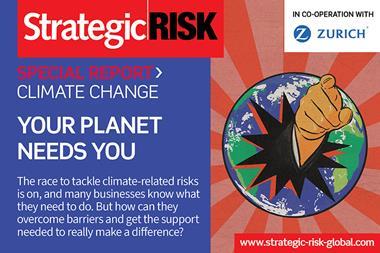COVID-19 should not be allowed to derail progress made in driving greater climate resilience
A global coalition of institutional investors, banks, insurers, rating agencies and governments, representing over $10 trillion in assets, has said the delay of the COP26 UN Climate Change Conference until next year should not be allowed to stall critical progress being made in building greater resilience to climate risk, after holding high-level talks at Climate Week NYC 2020.
The threat of asset damage, operational disruption and human suffering from physical climate risks and disasters has continued to rise in 2020, leaving economies, societies and communities exposed to the accelerating phenomena of ‘cascading’ risk.
The latest wildfires in the US illustrate this ripple effect, turbocharged by an extreme summer heatwave and compounded by the pandemic, impacting the power grid, water supplies and air quality.
According to the Coalition for Climate Resilient Investment (CCRI), with modern societies now highly dependent on networks, critical infrastructure assets and supply chains are more likely to trigger multiple risks and increase exposure.
Emma Howard Boyd, chair of the Environment Agency and CCRI co-chair, said: “The pandemic continues to hold the world’s focus, but it hasn’t stopped any other pre-existing health risks and economic shocks. Risks like storms and droughts will only get worse with climate change. Countries and businesses that prioritise short-term considerations ahead of long-term resilience will inevitably sow the seeds of future major crises.”
In response to the rising frequency of cascading events, the urgent integration of physical climate resilience into the mainstream infrastructure investment is the core CCRI goal. Investors, lenders and insurers and ratings agencies need this insight if they are to make informed financial decisions.
Providing a methodology to quantify the economic and financial risks and benefits will give financial markets a substantial incentive to embed resilience upfront and is a central CCRI objective.
The Coalition feels that:
- Adapt now or pay more later – Companies who fail to integrate risks early could end up locking-in quickly outdated infrastructure, facing revenue disruptions, hefty price tags to retrofit projects or retiring assets early.
- Resilient assets predicted to outperform – Properly integrating physical climate risks in investment decision making is a major opportunity. Resilience-smart assets are expected to financially outperform non-resilient assets, providing a reliable source of long-term secure cash flows to investors.
John Haley, Willis Towers Watson CEO and CCRI Co-Chair, said: “COVID-19 has shown with chilling clarity that the widespread costs of extreme events far exceed the upfront costs of prudent preparatory measures. Just like climate risk, the pandemic has been a systemic tidal wave, ripping through countries at speed, leaving behind profound socio-economic destruction.”
”We cannot afford to put on hold the more efficient, risk-informed investment decision-making to help save lives and economies from the foreseeable shocks in the years and decades ahead.”




















No comments yet